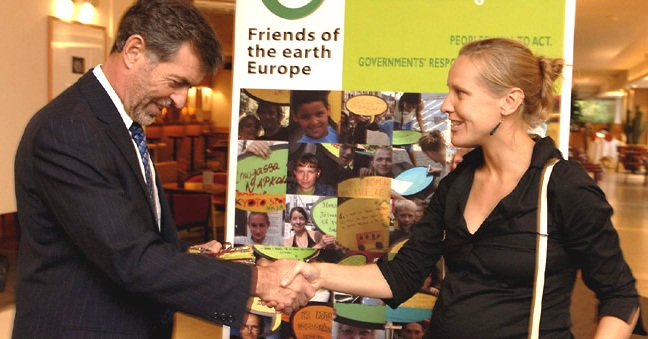Luxembourg/Brussels, 23 October – Friends of the Earth Europe pushed European citizens’ concerns about climate change directly under the noses of EU Environment Ministers today, just before their Council meeting in Luxembourg. Today the Ministers will agree on the EU’s position for the upcoming United Nations climate conference in Kenya next month. However, leaked documents reveal that the position will be weak and will lack a crucial long-term perspective in the fight against global warming.
Esther Bollendorff, Climate Campaigner at Friends of the Earth Europe said, “EU Ministers should show guts at the United Nations climate conference next month, initiating negotiations about the next Kyoto period, which will begin in 2013. A delay could cause us to exceed the critical temperature rise of two degrees Celsius.”
Friends of the Earth Europe is concerned because the conclusions for the Environment Council meeting today do not set a precise timetable for the next steps needed to cut global emissions. To keep emissions cuts on track, negotiations for the post 2012 period should begin at the UN climate meeting this year (COP/MOP2), but failing that they absolutely must be launched at COP/MOP3 in 2007. The negotiations must then be finalised by the end of 2008 in order to avoid a gap between the first period (2008-2012) and the second period, starting in 2013. Additional intersessional meetings will be necessary in order to respect this short but critical timeline. [1].
There is also no mention in the Environment Council’s conclusions of pathways for developing countries to reduce their emissions. [2] This is despite the EU being fully aware of the urgency of the problem and it acknowledges that even a temperature rise of 2 degrees can not be considered as wholly safe. [3]
Friends of the Earth Europe does, however, welcome pressure from some Member States for countries in the EU to report by the end of October on demonstrable progress and the current status of their commitments to be fulfilled under the Kyoto Protocol. [4]
“Political credibility of the EU’s leadership role in international climate negotiations will be seriously undermined if there is no transparency about the achievements made cutting carbon dioxide emissions at home,” Ms Bollendorff explained.
The environmental campaign group has compiled photos of people from across the EU who are all demanding political action from governments to fight climate change, while committing to make their personal lifestyles more climate-friendly in return. 27 photo booklets were presented to the Finnish Environment Minister Jan-Erik Enestam, one for each of the 25 EU Ministers including Romania and Bulgaria.
“To fight climate change, we need a radical shift from dirty energy sources to renewable energy and energy efficiency measures. This is what people all over Europe want to see. But this evolution will take time, so the political process has to have a long term perspective and it has to start now,” Ms Bollendorff added. [5]
***
Notes to editors
[1] These Intersessionals would have to be supported politically and financially by the EU. It took 8 and a half Intersessionals (3 a year) to do the preparatory work for an agreement on the Kyoto Protocol. [2] The 2005 Environment Council decided that “reduction pathways by the group of developed countries in the order of 15-30% by 2020 and 60-80% by 2050 should be considered”. Even though we are convinced that only the upper range of these targets will contribute to meeting the EU objective of staying below 2C, we believe that these pathways should be in the conclusions and eventually become legally binding. [3] EU submission to the United Nations Framework Convention on Climate Change on the Review of the Kyoto Protocol pursuant of its Article 9 available at:http://unfccc.int/resource/docs/2006/cmp2/eng/misc03.pdf [4] Article 3.2 of the Kyoto Protocol demands that each Annex I country “shall by 2005 have made demonstrable progress in achieving its commitments under this Protocol”. This report is overdue by 1 year by countries such as Greece, Italy, Luxembourg and Portugal. [5] See Friends of the Earth Europe press release at: http://www.foeeurope.org/press/2006/joint_19_Oct_Energy_Efficency.htm






